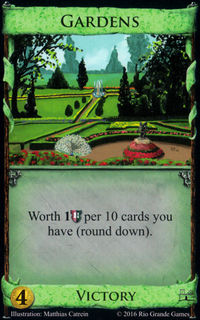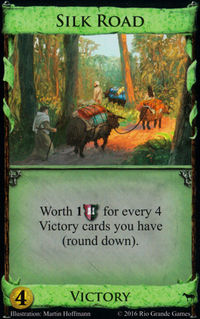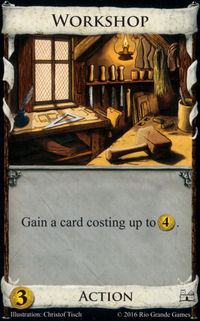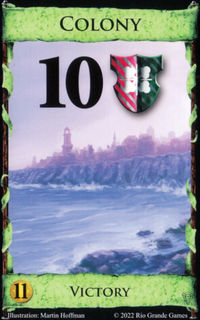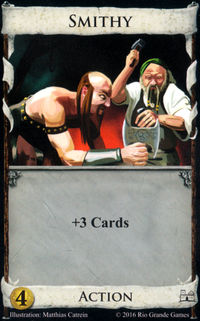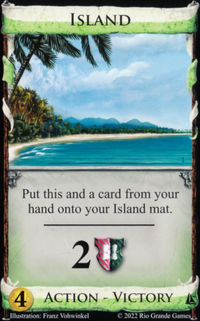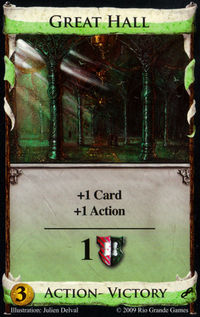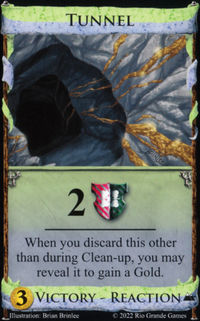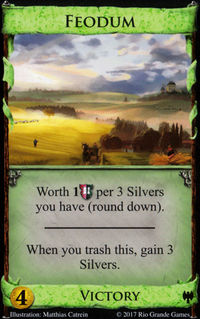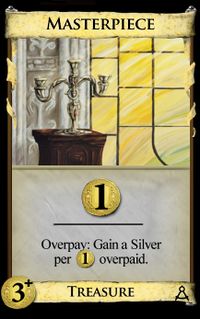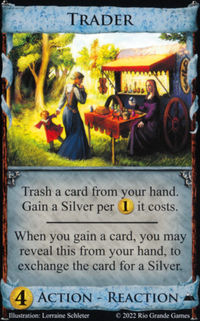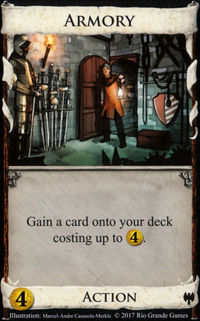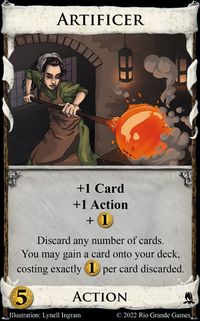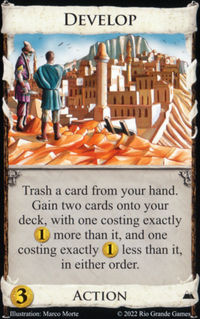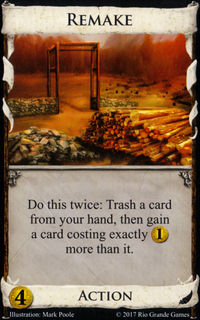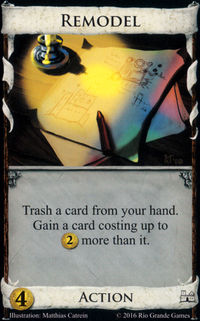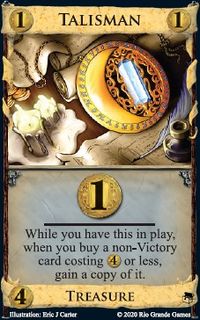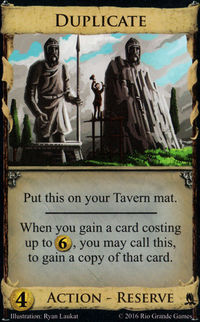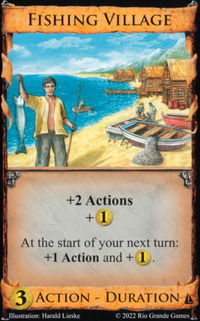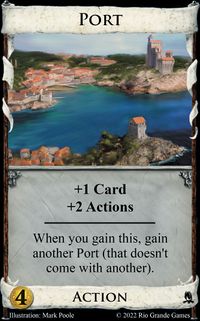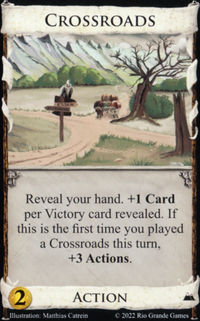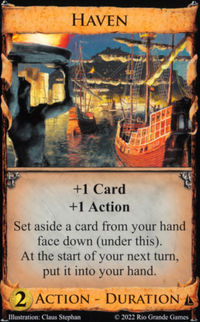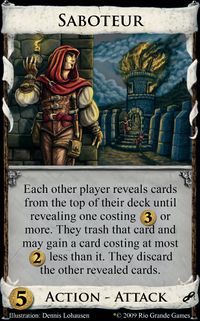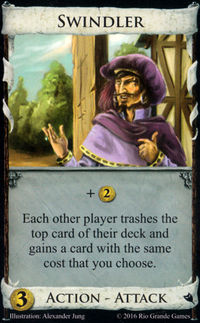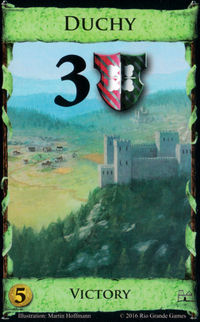Rush (strategy)
A rush strategy is one which attempts to end the game as quickly as possible, typically with a three-pile ending. These are typically associated with alternate VP approaches such as Gardens and Silk Road, and are facilitated by gainers such as Workshop and Ironworks.
Sometimes, the term "rush" will refer to a "Province rush" in a Colony game. In a Province game, such a strategy is just Big Money.
Contents |
[edit] Rush strategy
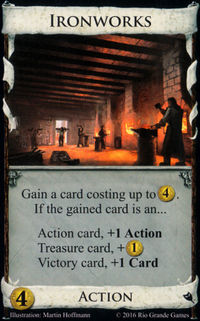
Original article by WanderingWinder
[edit] What characterizes the Rush?
A Rush deck is conceptually very simple – get the game to end on three piles as fast as possible, while having some way to have the lead when this happens. A decent rush deck should be able to pile out the game in less time than flat big money could get to four provinces, generally around the time that a BM-Smithy mirror would be ending.
[edit] What’s Good For The Rush?
This is also pretty simple. You need some way of gaining things, and some way to do it fast. You also need some kind of cheap ![]() to be able to get, because 8 extra Estates is basically never going to cut it – you just CAN’T be THAT fast. Furthermore, you basically need your gainer to be able to gain those
to be able to get, because 8 extra Estates is basically never going to cut it – you just CAN’T be THAT fast. Furthermore, you basically need your gainer to be able to gain those ![]() cards as part of the piling out strategy.
cards as part of the piling out strategy.
Thus, your major contenders on the ![]() side are Gardens and Silk Roads; occasionally Islands and rarely Great Halls or Tunnels. Feodum needs specific enablers to qualify as a rush, such as Masterpiece or Trader, because for it to even be worth 2
side are Gardens and Silk Roads; occasionally Islands and rarely Great Halls or Tunnels. Feodum needs specific enablers to qualify as a rush, such as Masterpiece or Trader, because for it to even be worth 2 ![]() you need 6 Silvers, and that does not speed up three pile endings, so it seems more of a Slog card, generally.
you need 6 Silvers, and that does not speed up three pile endings, so it seems more of a Slog card, generally.
On the gainer side, you want most preferably Ironworks, or failing that Workshop, Armory or even Artificer. Occasionally, you can do something with Develop, Remake, or Remodel to crank out a bunch of cheap piles, but this is pretty rare. Talisman is very good for ending the game fast enough, but getting the ![]() you need is a real issue – you really don’t want to buy everything out one at a time, that’s just far too slow for a rush. Duplicate may work better in this role.
you need is a real issue – you really don’t want to buy everything out one at a time, that’s just far too slow for a rush. Duplicate may work better in this role.
Trashing is really interesting here. Unlike for the slog, where trashing, particularly strong trashing, is terrible, here it CAN be good. Very often it is superfluous and can slow you down. But in the right kingdom (particularly you will need some way to get multiple gainers played in a turn, so a village), trashing down INTO your rush can make it a bit faster, and a bit faster is just what you need. Chapel works here, but Remake is the king, IF you have something to do on other than silver, AND a village to take advantage of your higher action density. For example, a trashing strategy with Chapel into a Gardens rush is extremely strong in the (unused) Game 9 set of the 2011 Kingdom Design Challenge.
[edit] How can I play the Rush?
Basically, you’re trying to rush them out, almost no matter what they do. You need to keep an eye on the score. The big thing is that you want to make sure they can’t block you out from enough of your key ![]() card – generally they can’t contest you, as that only speeds game end, but you don’t want to wait and buy gainers too long, because then they WILL be able to block you, and probably have some Provinces to boot, and suddenly you can’t rush the game to an end.
card – generally they can’t contest you, as that only speeds game end, but you don’t want to wait and buy gainers too long, because then they WILL be able to block you, and probably have some Provinces to boot, and suddenly you can’t rush the game to an end.
The other big point is to watch them for hitting piles – you need to have a plan for ending three piles, but this plan can be flexible. An opponent who needs to hammer a cheap pile very hard is the best friend for a Rush deck, because that becomes a de facto third pile, and speeds up your ending. This is particularly true if the pile is a Village, particularly Fishing Village, Port or especially Crossroads, as the extra actions can let you double-play terminal gaining cards. Haven is another nice card, being cheap enough to buy out while also giving you the ability to make sure you get the precise one gainer played per turn that you typically want.
It’s worth noting that rush decks are in the abstract the most resistant to attacks of almost all kinds. Curses? Thanks for ending another pile for me. Handsize? I probably had junk or collisions anyway, and it’s not like I was going to buy something expensive. Trashing? This can be potentially annoying, but Saboteur and Swindler tend to speed up the game end, which is good for rush, and Treasure-trashers you can generally brush off with impunity.
[edit] Matchups
Against Big Money
Not the best matchup for rush, actually, because Big Money is one of the more likely decks to be able to get enough points from Provinces quick enough to stop you from ending – and if you’re too far gone, they can end it themselves. If you aren’t going to be fast enough, you generally need to abort to a slog and try to win the long game. You can even play a bit of a hybrid here, and decide how much rush vs slog you want to go for in terms of how much big money they are going, and how much longevity they are going for. If they are going for a longer deck, play more Rush-y, but if they go more Big Money blitz, you play more Slog-y
Against Engines
This is a good matchup for the rush. The idea is to play your basic rush gameplan, but look for piles they are going after to help you to three pile. If they have a fast enough engine, they may be able to get enough points early enough to block you from the ending you want – in this case, look and see if they’ve over-greened, because in order to be that fast, they’ve probably had to buy more green faster than they would against most other deck types, and this may well leave them susceptible to clogging. If this is the case, you can go slightly more in a slog direction to win the longer game, but you generally still need to have three piles in sight at all time. The strongest engines will just be able to beat you though, if they aren’t reliant on pile-driving a particular cheap pile.
Against the Slog
This is almost all about winning the split of the ![]() card you are going for, by enough that you can go ahead and end things instantly. Typically you’re looking for 6-2 or better. But if you only get 5-3 or even 4-4, you generally have to try to go for the quick ending anyway. 4-4 and worse, you can just be in bad shape – but you’re playing the rush, you ought to be able to win this split, and then with it, the game.
card you are going for, by enough that you can go ahead and end things instantly. Typically you’re looking for 6-2 or better. But if you only get 5-3 or even 4-4, you generally have to try to go for the quick ending anyway. 4-4 and worse, you can just be in bad shape – but you’re playing the rush, you ought to be able to win this split, and then with it, the game.
Against the Combo
It depends on the combo, but generally it’s about whether you can get the game ended before their combo is set up. Speed is of utmost importance, and that means speed to get ALL piles out, not just your key card.
Against the Rush (mirror)
This is, again, about winning the split. This is so important here, you want to cut short your build-up of gaining gainers WAY earlier than you would in other matchups, and very early on head for the green. If you can win the split, that’s usually game.
If you tie the split though, there are two things that can happen. One is that you keep rushing down the other cards you need to end the game. But usually, because there’s lots of cards left in that gainer pile, you don’t actually want to do that, because there’s going to be all this extra awkward time with your Alt-VP and Estates empty where you are struggling to come up with enough to grab that last pile. So often in the tied split, you want to abort your rush and go for a slog, trying to get enough other ![]() (generally Duchies) to overcome, though you will still need to get 1-2 Estates away from them usually. Trashing is bad here, because it’ll lose you the split. And if there are MULTIPLE cheap alternate
(generally Duchies) to overcome, though you will still need to get 1-2 Estates away from them usually. Trashing is bad here, because it’ll lose you the split. And if there are MULTIPLE cheap alternate ![]() s, waiting for a slog isn’t going to happen (and you will probably want to build up just slightly more than you would in a normal mirror).
s, waiting for a slog isn’t going to happen (and you will probably want to build up just slightly more than you would in a normal mirror).
